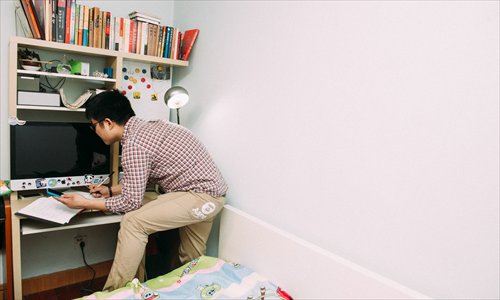

Permitting employees to work from home also allows companies to cut operating costs on office space and cost of rent. Photo: Li Hao/GT
"Only the upper-level management and managers of each department have to go to the office every day. The rest of the staff are given the choice of either staying at home or going to the office," said Li. "We're also planning to recruit some temporary freelancing staff for the busy period after Spring Festival, who can work from anywhere, even if it's outside Shanghai."
Allowing people to work from home might also have a public net benefit, according to Song Guojun, dean of the Environmental Policy and Planning Research Institute at the Renmin University of China.
In comments made to the People's Daily last year, Song encouraged more companies in Beijing to let their employees work from home, particularly when the air pollution was particularly severe.
"It makes sense for people to stay in when it is especially smoggy," said Song.
"Not only in terms of individuals' health, but also to alleviate the carbon burden on Beijing's air [caused by cars, offices and factories]."
"Getting more people to work from home is certainly a more realistic and effective measure for improving Beijing's air quality than suggesting that people should set off fewer fireworks during Spring Festival."
Combining home and office
Last summer, Chen Rui, a 30-year-old programmer, spent a month with four of his colleagues living and working in a rented apartment on Beijing's outskirts.
They had been given an urgent project that needed to be completed within 30 days, although the workload would normally take three months.
"The five of us asked the company to rent an apartment in Lishuiqiao, around Beijing's North Fifth Ring Road, to use as a work and living space," said Chen. "The secluded environment enabled us to concentrate on creating the program together. We were more efficient, and we managed to finish it before the deadline."
Ideas similar to Chen's have been gaining popularity overseas. To combat the solitude of working alone from home, communities have developed overseas based on gathering in a person's home and transforming it into a collective office space.
These arrangements have been dubbed "co-working spaces." One of the platforms for facilitating such arrangements is called Hoffice, which originated in Sweden last year.
"The problem with working at home for most of us, is to be so lonely in the complex soup we call life," said Chistofer Gradin Franzen, the founder of Hoffice, on their official website. "All our addictions of distracting ourselves, all escape mechanisms here and there - they're difficult to handle when you're on your own."
Tang endorsed co-working spaces as a productive alternative between working exclusively from home or in an office.
"I heard that when Jack Ma [founder of Alibaba Group] was starting his business, he and his team lived and worked together in a villa," said Tang. "This kind of arrangement fosters a relaxed but enthusiastic atmosphere, which helps productivity."
Too late to the dance?
However, as some companies in China warm to the idea of allowing employees to work from home, there are signs that overseas, corporations are moving away from the trend.
In 2012, Marissa Mayer, president and CEO of Yahoo, ended the company's work-from -home policy, and the following year, Hewlett-Packard followed suit, with CEO Meg Whitman distributing a memo encouraging employees to work from the office as much as possible.
In both cases, the executives explained in the memos that the change in policy was motivated by a desire to build a stronger culture of teamwork and collaboration.
An article published last November on Sina's news portal also suggested allowing employees to work from home did not always result in greater productivity. It noted in particular that for young married couples who are given permission to work from home after giving birth, the responsibility of having to look after a newborn child could be a distraction to productivity.
Although he said he enjoys working from home, even Zhou admitted it had certain short-comings.
"I don't have many opportunities to socialize with people, because most communication is done over the Internet," he said. "I seldom meet new people, which means that I'm not establishing any contacts to progress my career."
Tang suggested that in the end, it was about balance.
"Companies that adopt flexible work-from-home policies should make an effort to organize regular meetings as well as social events to encourage communication between staff and to cultivate a strong team spirit," said Tang.
Copyright ©1999-2018
Chinanews.com. All rights reserved.
Reproduction in whole or in part without permission is prohibited.